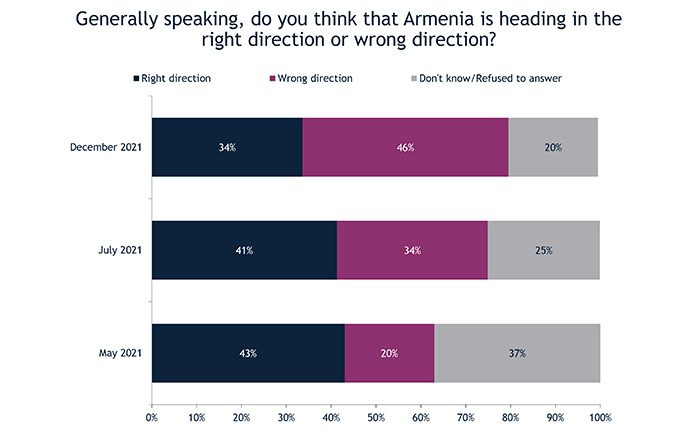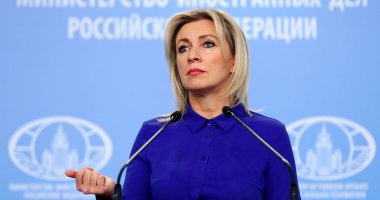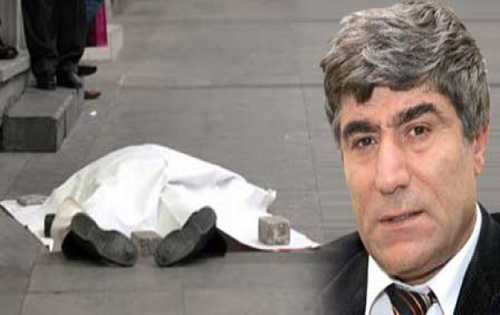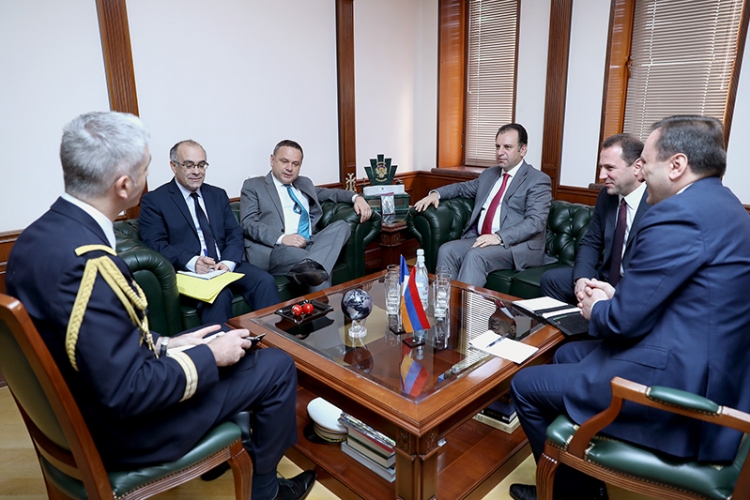By K. Khodanian
The US-based International Republican Institute has published its latest public opinion poll on Armenia. The poll includes quite interesting data on the domestic and foreign policy of the country, some of which are favorable for the government of Nikol Pashinyan, and some issues which should be a cause for concern for the authorities.
70% of the respondents have a positive view of the Armenia-Turkey dialogue and the establishment of diplomatic relations. The recent negotiations between the two countries remain the most discussed and debated issue in Armenia and the Diaspora. There are differences of opinion between those who reason with their emotions and those who are politically realistic. Some think that the Armenian side should push for the recognition of the Genocide by Turkey as a precondition for the talks, but the official view of the government is that these negotiations should take place without preconditions, focusing on the opening of the borders and the establishment of diplomatic relations.
If the data collected by the American poll-takers are accurate, then the authorities have the support of the vast majority of the people in Armenia to continue the process that began recently with the first meeting of the representatives of the two countries in Moscow. Another session is planned for later this month in Vienna, Austria. However, at any point in the negotiations, Ankara can bring to the table its own preconditions, demanding the end of the campaign for the recognition of the Genocide, or the Azerbaijani demand of providing a land corridor through the Zangezur region. In both cases, public opinion will change immediately, and today’s 70% approval will rapidly erode.
In recent years, the recognition of the Armenian Genocide by the United States and almost all European countries and institutions, has become a reality, and Turkey must come to terms with the fact that it has lost its battle against the recognition of the Genocide, and no Armenian government will agree to such a demand. The issue of the corridor also remains unacceptable for the Armenian side. The parties should thus focus on establishing neighborly relations and unblocking roads and other means of communication.
The other noteworthy outcome of the survey, is the question of “right track-wrong track.” At present, only 34% of Armenians express the opinion that the country is headed in the right direction, while 46% hold the opposite view. These figures are almost reversed in comparison to the results of polls from last July and May when more than 40% of the population believed the country was on the right track.
It should be noted, that almost everywhere in the world, the majority of the population is pessimistic about the future. The main reason for this phenomenon, are the hardships created by the pandemic, the global effects of inflation and rising prices on everyone’s pockets causing financial difficulties for many. In the case of Armenia, these factors are compounded by the impact of the war, and the unstable conditions on the borders, affecting the people’s perspective of the future.
Among those who think that the country is headed in the wrong direction, there is always a fear that they will eventually decide to emigrate to Russia, Europe, or United States. Although according to the latest data, the population of Armenia remained almost unchanged at the end of 2021. After the end of the pandemic, when travel became more accessible, many more people could seek their future somewhere else.
The picture displayed by the poll should be a cause for concern for the authorities in Armenia. Although the majority of those who participated in last June’s elections have voted for the ruling party, it seems that things have changed since then, and pessimism is more prevalent now. Prime Minister Pashinyan is the only one who can influence the attitude of citizens by taking his government’s message, priorities, and achievements directly to the people, by visiting different parts of the country, as he often did in the past, and by returning to his live social media appearances and having dialogue with the ordinary citizens.
The people need to hear more often from their leader.
MASSIS
Latest Poll: Good and Bad News for Pashinyan Administration
- No comments
- 3 minute read
The Positive Outcomes of the Brussels Meeting
By: K. KHODANIAN Last September, Azerbaijani troops invaded Artsakh, prompting over…
- MassisPost
- April 14, 2024
- No comments
- 2 minute read
It’s Not Armenia That Has Distanced Itself From Russia, but Rather the Other Way Around
By K. KHODANIAN Armenia and Russia are experiencing notable tensions in their…
- MassisPost
- April 7, 2024
- No comments
- 2 minute read
Stating the Obvious: Kigali Genocide Memorial and the Armenian Genocide
Gomidas Institute Initiates Campaign on Kigali Genocide Memorial and the Armenian…
- MassisPost
- April 7, 2024
- No comments
- 3 minute read
How an Armenian Family Helped in Building Modern Egypt
By ARUNANSH B. GOSWAMI Recently the author of this article was in…
- MassisPost
- April 5, 2024
- No comments
- 5 minute read










